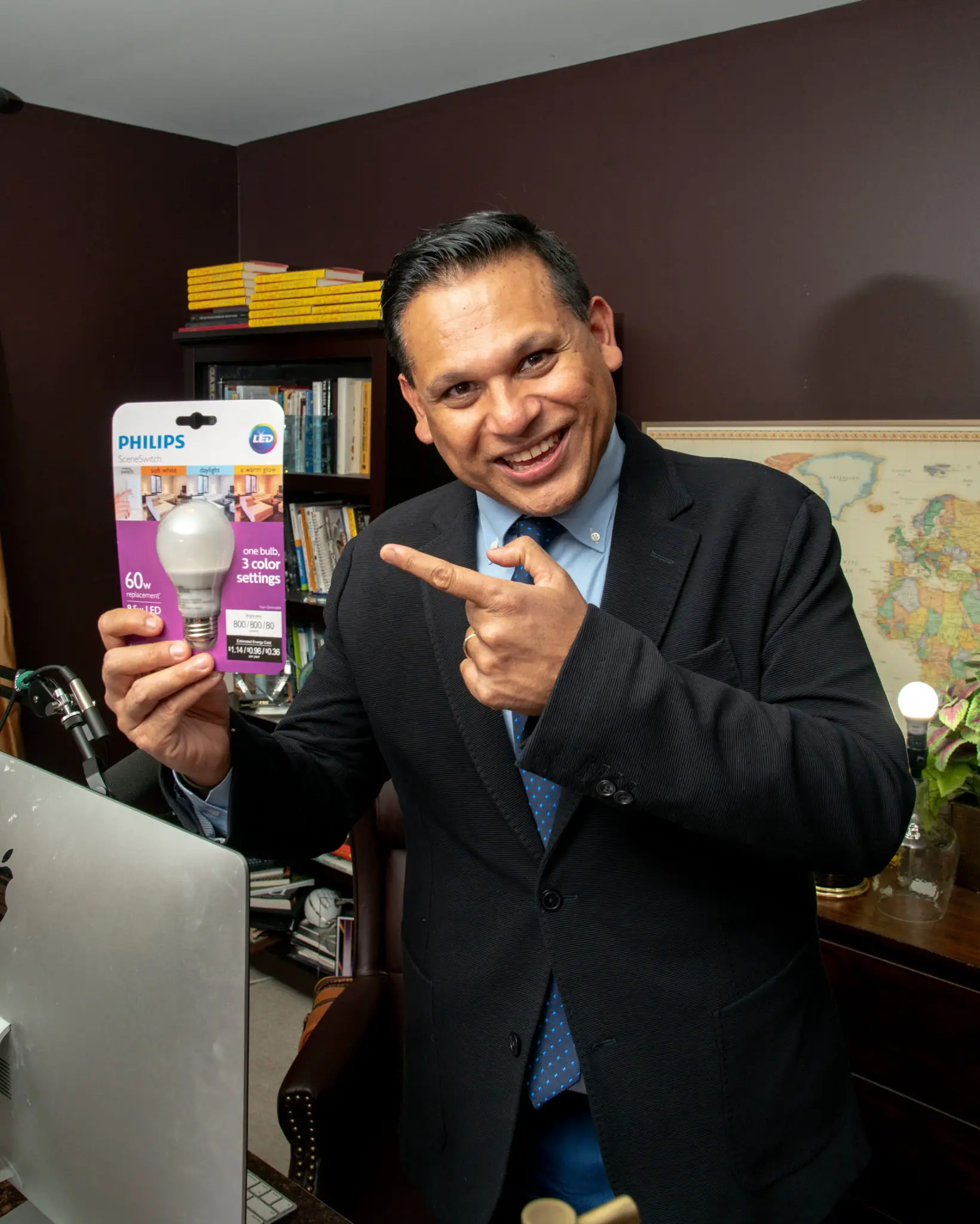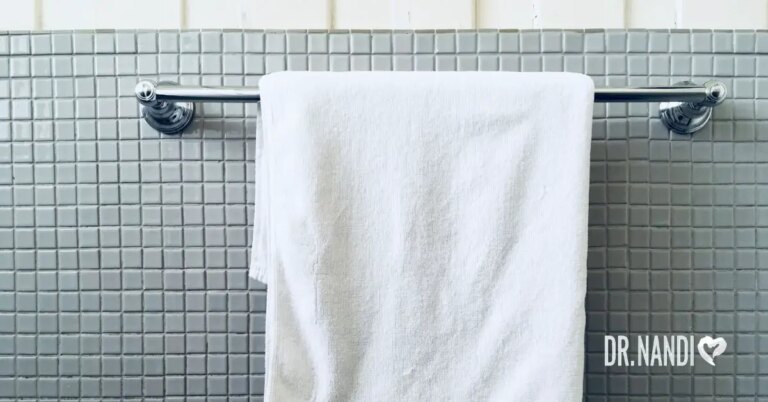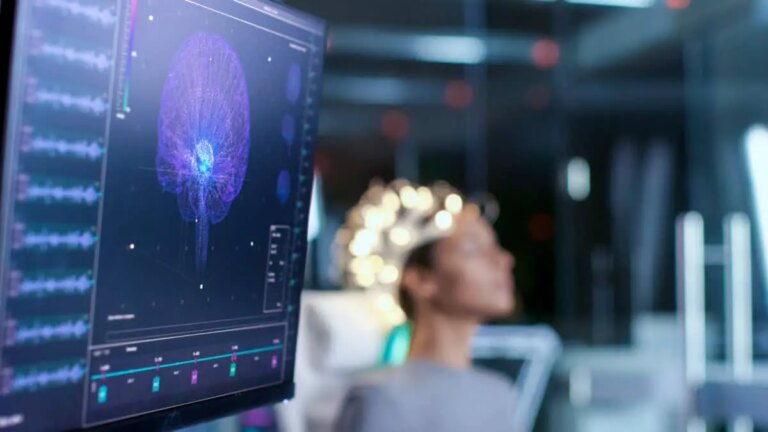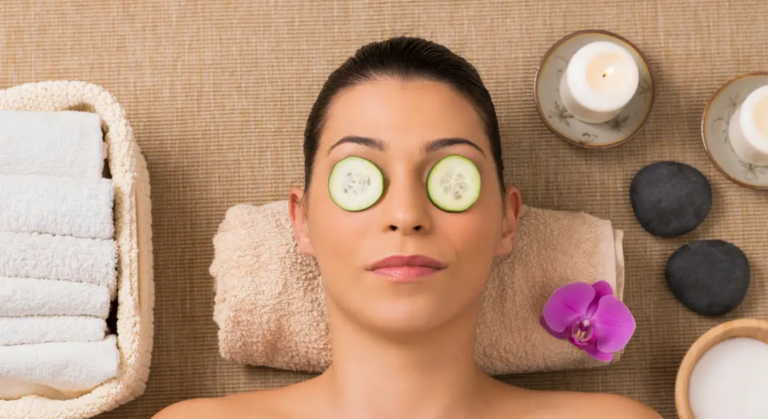This post is sponsored by Signify. I received compensation, but all opinions are my own.
When it comes to our health and well-being, we often overlook the importance of caring for our eyes. Considering the fact that we spend the majority of our time indoors and in front of screens, however, it is worth making eye comfort a priority. Our vision is vitally important to us in order to maintain our well-being and independence, so it’s important to take the time to learn about your eyes.
What Are Common Eye Problems?
The most common issue found with people’s vision are refractive errors, such as nearsightedness or farsightedness. Refraction errors result when the shape of someone’s eye somehow prevents light from focusing directly on the person’s retina. So the length of the eyeball, alterations in the shape of the cornea, or even the aging of the eye’s lens can result in refraction errors. (1)
In order to properly understand how this happens, it’s helpful to see that a refraction “is the bending of light as it passes through one object or another” and “vision occurs when light rays are bent (refracted) as they pass through the cornea and the lens.” The retina converts the light-rays into messages that are sent through the optic nerve to the brain. The brain interprets these messages into images we see. It’s quite a fascinating process! (1)
Here are some common refraction (or vision) errors:
- Nearsightedness: This is also called myopia, and it’s a condition where the objects up close appear clear while objects far away tend to be blurry.
- Farsightedness: This is also called hyperopia, and it is a very common refraction error where objects in the distance appear to be more clear than objects that are close.
- Astigmatism: This is a condition where the eye does not focus light evenly on the retina. This causes images to appear blurry and stretched. (1, 4)
- Presbyopia: This tends to be an age-related condition. With presbyopia, the ability to focus while up-close is difficult, since as the eye ages, the lens tends to be unable to change shape enough to allow itself to focus on close objects.

Creating An Environment For Eye Comfort
Just as we can create a better environment for our lungs by avoiding breathing in toxins, or for our digestive systems by eating whole foods, we can also create a better environment for our eyes to help them work best and be most comfortable. While our eye health can be easily overlooked, it’s time to take your visual comfort seriously, especially since screens and other indoor lighting are dominating our lives.
According to research, “people feel that LED bulbs are more comfortable for their eyes than other bulbs,” “Parents rate their children’s eyesight as more important than their school performance, stress level and fitness,” and “70% of American parents surveyed agree that quality lighting is vital to a child’s performance at school. In many countries, over 50% of people see eye care as an important priority.” (5)


My Personal RX: 13 Tips To Maintain Optimal Eye Health
Your eyesight is important. Consider these simple steps to help create a better, more comfortable environment for your eyes:
- If in front of screens (computers, smartphones, televisions) for extended periods of time, every 20 minutes, close your eyes for 20 seconds to allow them to relax.
- Use quality light such as Philips LEDs which mimic natural light, so your eyes feel comfortable. Philips LEDs like SceneSwitch have been tested and meet key “eye comfort criteria”. They have been evaluated for their quality and against factors that can impact eye comfort such as flicker, glare, dimming and color rendering, among other effects.
- If outdoors, wear sunglasses with 100% UV protection to help protect your eyes from the sun. It’s helpful to keep a pair with you in your bag or car so they are always nearby.
- To exercise and strengthen your eyes, incorporate simple, yet effective eye yoga exercises for a few minutes each day.
- Schedule regular check-ups with an eye specialist, who will be able to detect the first signs of any eye conditions or diseases.
- Eat a balanced diet with plenty of fruits and vegetables, healthy fats, nuts and seeds, herbs and spices, and some organic meat and animal products (my family eats a largely plant-based diet). Your diet impacts everything about your body, including your eye health. I have known people to experience improved eyesight when they changed their diet to be more healthy! Be sure to include foods that are rich in antioxidants, such as Vitamin A and C. Leafy, green vegetables and fish are excellent sources of antioxidants, and certain foods – fatty fish like salmon – contain essential omega-3 fatty acids that are extremely beneficial to the health of your macula, which is the portion of the eye responsible for your central vision. (6)
- Exercise. This improves your blood circulation, which improves oxygen levels in your eyes and helps remove toxins.
- Maintain a healthy weight. Being overweight increases your risk of developing certain health conditions, many of which lead to vision loss.
- Get a good night’s sleep. You often feel the difference in your eyes when you get the sleep you need, so not only will you look great, but a good rest will support your eye health.
- Wash your hands! Think about how often you touch or rub your eyes. Keeping your hands clean and germ-free will help keep your eyes healthy.
- Don’t smoke. Smoking exposes your eyes to high levels of oxidative stress, which is thought to increase your risk of a variety of health conditions in your eyes.
- Keep your computer screen in the right place! It’s beneficial to keep your computer screen at least 20” away from your eyes, keep the top of your screen slightly below eye level, adjust the lighting to minimize glare, and ensure you are blinking frequently.
- Use lubricating eye drops to help soothe irritated, dry eyes.
- Take my Eye Max Supplement daily for optimal eye health.
- Optimize your health and wellness with my comprehensive 50-page step-by-step Protocol Guide.
Think about how much worse off you’d be if your eyes didn’t function properly. Think about how inconvenience you’d be if you were unable to see clearly. The unfortunate truth is that many people who sit in front of a computer screen all day or operate under poor lighting are well on their way to a future filled with less than ideal vision. Correcting this path, however, is neither difficult nor confusing! But utilizing better lighting, you can greatly benefit your eyes and protect this precious tool that is your sight. Instead of waiting for your vision to become so bad that it’s irreversible, try out some new lighting, and also correct your diet so as to include nutritious, eye-healthy ingredients to better protect your vision from the wear and tear of harsh lighting and age.

References
- https://nei.nih.gov/healthyeyes/problems
- https://nei.nih.gov/healthyeyes/myopia
- https://nei.nih.gov/healthyeyes/hyperopia
- https://nei.nih.gov/healthyeyes/astigmatism
- https://www.usa.philips.com/c-m-li/led-lights/eyecomfort
- http://www.bausch.com/vision-and-age/20s-and-30s-eyes/healthy-eyes
- https://nei.nih.gov/healthyeyes/eyehealthtips
- https://www.webmd.com/eye-health/ss/slideshow-eyes-sight-foods




















